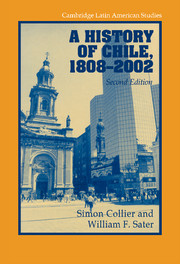Book contents
- Frontmatter
- Contents
- List of maps
- Preface to the Second Edition
- A note on geography
- CAMBRIDGE LATIN AMERICAN STUDIES
- PART I Birth of a nation-state, 1800s–1830s
- PART II The rise of a republic, 1830s–1880s
- PART III The nitrate era, 1880s–1930s
- PART IV Industrial advance and the dawn of mass politics, 1930s–1960s
- PART V Democracy and dictatorship, 1960s–2000s
- Glossary of Spanish terms
- Initials and acronyms
- Further reading
- Index
PART V - Democracy and dictatorship, 1960s–2000s
Published online by Cambridge University Press: 05 June 2012
- Frontmatter
- Contents
- List of maps
- Preface to the Second Edition
- A note on geography
- CAMBRIDGE LATIN AMERICAN STUDIES
- PART I Birth of a nation-state, 1800s–1830s
- PART II The rise of a republic, 1830s–1880s
- PART III The nitrate era, 1880s–1930s
- PART IV Industrial advance and the dawn of mass politics, 1930s–1960s
- PART V Democracy and dictatorship, 1960s–2000s
- Glossary of Spanish terms
- Initials and acronyms
- Further reading
- Index
Summary
Between 1964 and 1973 two reforming governments, adopting different forms of revolutionary rhetoric, attempted deep structural reforms in an effort to cure Chile's outstanding social problems and slow economic growth. Whatever their immediate successes, neither the Christian Democrat “revolution in liberty” nor the Marxist parties' “transition to Socialism” succeeded in their aims. Politics on all sides became ideologically highly charged, with acute polarization of opinion setting in during Salvador Allende's presidency (Chapters 11 and 12). This growing crisis led to the breakdown of the political system in September 1973, and the seizure of power by the armed forces. Under the stern leadership of General Pinochet, a neo-liberal economic scheme was imposed on Chile, and drastic national reorganization took place. The results, inevitably, were mixed. At a time of steady economic growth, based once again on exports, the Pinochet regime was successfully challenged by the democratic opposition (led by Christian Democrats and Socialists), which, in the shape of a new and disciplined political coalition, took charge of the country in March 1990 (Chapter 13). This coalition elected three presidents in succession, attempted to correct some of the deep inequities left by the outgoing regime, and saw Chile into the twenty-first century (Chapter 14).
- Type
- Chapter
- Information
- A History of Chile, 1808–2002 , pp. 303 - 304Publisher: Cambridge University PressPrint publication year: 2004

